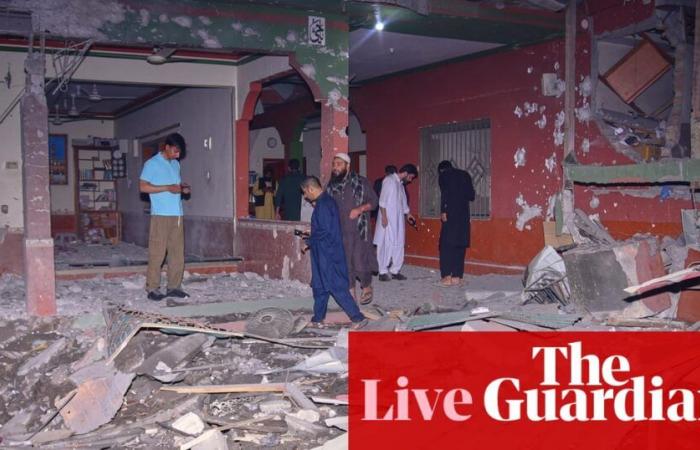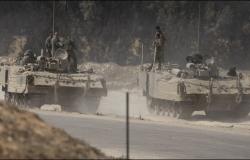
Pakistan responding ‘forcefully’ to ‘act of war’ by India, says prime minister
Pakistan’s prime minister, Shehbaz Sharifsaid India has carried out “cowardly” attacks on five locations in Pakistan-administered territory.
In a statement posted to X, Sharif said:
Pakistan has every right to respond forcefully to this act of war imposed by India, and a forceful response is being given.
He said the “entire nation” stands with Pakistan’s armed forces on “how to deal with the enemy”.
Key events
Please turn on JavaScript to use this feature
US secretary of state Marco Rubio has told reporters that he is monitoring the situation between India and Pakistan closely.
Rubio has said he will continue to engage both Indian and Pakistani leadership towards a peaceful resolution and echoed President Trump’s comments that “this hopefully ends quickly.”
Protests against India have broken out in the Pakistani city of Hyderabad. Indian flags have been defaced as well as Images of prime minister Narendra Modi.
Pakistan death toll rises to eight
A Pakistani military spokesperson has told the Reuters and AFP news agencies that the death toll from Indian strikes on Pakistan has risen to eight civilians.
Two further people have been reported missing with 35 injured in the strikes.
The spokesperson reported up to 24 strikes across six locations.
Air India diverts two international flights
Two Indian water international flights en route to Amritsar are being diverted to Delhithe airline has announced.
The airline has said it has cancelled all flights to and from Jammu, Srinagar, Leh, Jodhpur, Amritsar, Bhuj, Jamnagar, Chandigarh and Rajkot until midday local time on Wednesday.
Meanwhile, in a statement Qatar Airways says it has temporarily suspended flights to Pakistan.
We’re getting some pictures from on the ground in Pakistan-administered Kashmir after India fired missiles at Pakistani territory.
A US state department spokesperson has said they are aware of reports of the ongoing attacks but had “no assessment to offer at this time.”
This remains an evolving situation and we are closely monitoring developments.”
In recent days, Washington has urged the nuclear-armed neighbours to work with each other to de-escalate tensions and arrive at a “responsible solution.”
US leaders, including president Donald Trumpoffered support to India after the 22 April militant attack in which 26 people were killed. American officials did not directly blame Pakistan.
Analysts said last month that Washington may leave India and Pakistan on their own in the early days of the tensions, in part because it already has a lot to deal with, given US involvement in trying to reach diplomatic goals in Russia’s war in Ukraine and Israel’s war in Gaza.
Indian airline Spice Jet has said that due to the ongoing situation, “airports in parts of northern India” including Dharamshala, Leh, Jammu, Srinagar and Amritsar are closed.
News of the strikes have also hit India’s stock futures with the benchmark NSE Nifty 50 index falling 1.19%.
Pakistan official confirms at least two Indian jets shot down
Shah More Baloch
The director general of the media wing of Pakistan’s armed forces has confirmed to the Guardian that at least two jets of the Indian air force have been shot down.
“I confirm that we have shot down at least two Indian Air Force jets,” said DG Lt General Ahmed Sharif Chaudhry.
-Separately a senior security official, requesting anonymity, said that the military shot down three Indian jets.
“We have shot down one jet in Bathinda, Indian Punjab province bordering with Pakistan Punjab province, and two jets in Indian occupied Kashmir in Awantipora and Akhnoor. They were in their airspace after the attacks and we had fired missiles,” said the official.
He added that “India had started the conflict with its attacks on civilians in Pakistan. We had to retaliate. We had to protect our sovereignty.”
Cross border shelling continues across line of control
Shah More Baloch
Cross border firing continues across the line of control between parts of Pakistan and India administered Kashmirafter Indian airstrikes inside Pakistan.
Jawad Ahmed Parasfrom Neelum Valley in Pakistan administered Kashmir told the Guardian that the cross-border firing is going on without any pause. Mortar shells are being fired from both sides on checkpoints.
Paras said “the loud explosions have been heard in the valley since the Indian airstrikes. Everyone is awake and very worried. We don’t know what will happen tomorrow. Some people who had built shelters and bunkers have moved to them. None has seen such severe firings over two decades.”
After the Indian airstrikes, we are terrified. We can’t sleep tonight. None can sleep when the mortars are fired and everyone is worried about his life.”
The strikes came just hours after Indian prime minister Narendra Modi said that water flowing across India’s borders would be stopped. Pakistan had warned that tampering with the rivers that flow from India into its territory would be an “act of war.”
Modi did not mention Islamabad specifically, but his speech came after Delhi suspended its part of the 65-year-old Indus Waters Treaty, which governs water critical to Pakistan for consumption and agriculture.
“India’s water used to go outside, now it will flow for India,” Modi said in a speech.
The Indus treaty governs the distribution and use of waters from the Indus River and its tributaries, which feed 80% of Pakistan’s irrigated agriculture and its hydropower.
As well as suspending the treaty, Delhi has suspended trade with Pakistan, summoned and expelled its diplomats, and suspended visas for Pakistanis. Pakistan has also suspended all trade with India and closed its airspace to Indian airlines.
Iranian foreign minister Abbas Araghchi is expected in Delhi on Wednesday, two days after talks in Islamabad with Pakistani prime minister Shehbaz Sharif.
Tehran has offered to mediate between the two nations, and Araghchi will be the first senior foreign diplomat to visit both countries since the 22 April attack sent relations plunging.
If you’re just joining us, India has attacked nine sites in Pakistan and Pakistan-administered Kashmir on Wednesday with at least three deaths reported. Pakistan has said it was mounting a response as the worst fighting in years erupted between the two countries.
Armies of the nuclear-armed neighbours have also exchanged intense shelling and heavy gunfire across their frontier in disputed Kashmir in at least three places, police and witnesses told the Reuters news agency.
The offensive has occurred amid heightened tensions in the aftermath of an attack on Hindu tourists in Indian-administered Kashmir last month. Islamist assailants killed 26 men in the 22 April attack, the worst such violence targeted at civilians in India in nearly two decades.
India said it struck “terrorist infrastructure” where attacks against it were planned and directed. Pakistan’s defence minister has told local media that all sites targeted by India were civilian and not militant camps.
Pakistan’s prime minister, Shehbaz Sharif, has announced a meeting of the national security committee in Islamabad following the strikes.
Pakistan’s Minister of defence has confirmed at least three civilians, including a child, were killed after India fired missiles at Pakistani territory, according to AFP.
“They have targeted multiple locations, which all are civilian … We have confirmed reports of three civilians killed that includes one child,” Khawai Muhammad ASIf Told AFP.
Reuters is reporting that senior Indian officials spoke to counterparts in the US, UK, Saudia Arabia, UAE and Russia to brief them on the steps taken by the military.
A diplomatic official has told the news agency that this included a discussion between India’s national security advisor and US secretary of state Marco Rubio after the strikes took place.
UN secretary-general calls for ‘restraint’
UN secretary general António Guterres is “very concerned” about the Indian military operations across the line of control and the international border, a spokesperson has said.
The UN chief has called for maximum military restrain from both India and Pakistan.
“The secretary-general is very concerned about the Indian military operations across the Line of Control and international border. He calls for maximum military restraint from both countries,” the spokesperson said.
“The world cannot afford a military confrontation between India and Pakistan.”







